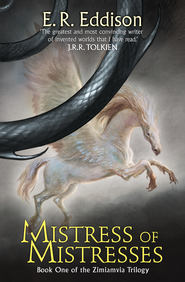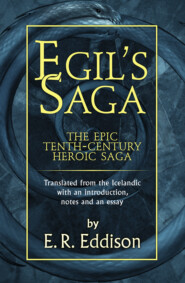По всем вопросам обращайтесь на: info@litportal.ru
(©) 2003-2024.
✖
The Mezentian Gate
Автор
Год написания книги
2019
Настройки чтения
Размер шрифта
Высота строк
Поля
XXV. Lornra Zombremar (#litres_trial_promo)
XXVI. Rebellion in the Marches (#litres_trial_promo)
XXVII. Third War with Akkama (#litres_trial_promo)
BOOK SIX: LA ROSE NOIRE (#litres_trial_promo)
XXVIII. Anadyomene (#litres_trial_promo)
XXIX. Astarte (#litres_trial_promo)
XXX. Laughter-loving Aphrodite (#litres_trial_promo)
XXXI. The Beast of Laimak (#litres_trial_promo)
XXXII. Then, Gentle Cheater (#litres_trial_promo)
XXXIII. Aphrodite Helikoblepharos (#litres_trial_promo)
The Fish Dinner: Transitional Note (#litres_trial_promo)
BOOK SEVEN: TO KNOW OR NOT TO KNOW (#litres_trial_promo)
XXXIV. The Fish Dinner: First Digestion (#litres_trial_promo)
XXXV. Diet a Cause (#litres_trial_promo)
XXXVI. Rosa Mundorum (#litres_trial_promo)
XXXVII. Testament of Energeia (#litres_trial_promo)
XXXVIII. Call of the Night-Raven (#litres_trial_promo)
XXXIX. Omega and Alpha in Sestola (#litres_trial_promo)
GENEALOGICAL TABLES (#litres_trial_promo)
MAP OF THE THREE KINGDOMS (#litres_trial_promo)
Footnote (#litres_trial_promo)
Also by E. R. Eddison (#litres_trial_promo)
About the Publisher (#litres_trial_promo)
INTRODUCTION (#ulink_2068f383-dcae-5aaa-af62-6f1dc7486e0d)
BY PAUL EDMUND THOMAS (#ulink_2068f383-dcae-5aaa-af62-6f1dc7486e0d)
THE twelfth chapter of E. R. Eddison’s first novel, The Worm Ouroboros, contains a curious episode extraneous to the main plot. Having spent nearly all their strength in climbing Koshtra Pivrarcha, the highest mountain pinnacle on waterish Mercury, the Lords Juss and Brandoch Daha stand idly enjoying the glory of their singular achievement atop the frozen wind-whipped summit, and they gaze away southward into a mysterious land never before seen:
Juss looked southward where the blue land stretched in fold upon fold of rolling country, soft and misty, till it melted in the sky. ‘Thou and I,’ said he, ‘first of the children of men, now behold with living eyes the fabled land of Zimiamvia. Is that true, thinkest thou, which philosophers tell us of that fortunate land: that no mortal foot may tread it, but the blessed souls do inhabit it of the dead that be departed, even they that were great upon earth and did great deeds when they were living, that scorned not earth and the delights and the glories thereof, and yet did justly and were not dastards nor yet oppressors?’
‘Who knoweth?’ said Brandoch Daha, resting his chin in his hand and gazing south as in a dream. ‘Who shall say he knoweth?’
The land of Zimiamvia probably held only a fleeting and evanescent place in the minds of Eddison’s readers in 1922, because this, the first and last mentioning of Zimiamvia in Ouroboros, flits quickly past the reader, and though it has a local habitation and a name, it does not have a place in the story. Yet in the author’s mind, the name rooted itself so deeply that its engendering and growth cannot be clearly traced. Where did this name and this land come from? How and when was Zimiamvia born? How, while writing Ouroboros in 1921, did Eddison come to think of including this extraneous description of a land inconsequential to the story? Why did he include it?
Who knows? Who shall say he knows? No living person can answer these questions with certainty. What is certain is that Zimiamvia existed in Eddison’s imagination for at least twenty-three years and that he spent much of the rare leisure time of his last fifteen years writing three novels to give tangible shape to that misty land whose existence the Lords Juss and Brandoch Daha ponder and question in those moments on the ice-clad jagged peak of Koshtra Pivrarcha.
When he finished Ouroboros in 1922, Eddison did not ride the hippogriff-chariot through the heavens to Zimiamvian shores directly. Instead he remained firmly earth-bound and wrote Styrbiorn the Strong, a historical romance based on the life of the Swedish prince Styrbiorn Starki, the son of King Olaf, who died in 983 in an attempt to usurp the kingdom from his uncle, King Eric the Victorious. Eddison finished this novel in December 1925, and on 3 January 1926, during a vacation to Devonshire, he found himself desiring to pay homage to the Icelandic sagas that had inspired so many aspects of Ouroboros and Styrbiorn the Strong: ‘Walking in a gale over High Peak Sidmouth … I thought suddenly that my next job should be a big saga translation, and that should be Egil.’ After noting his decision, he justified it: ‘This may pay back some of my debt to the sagas, to which I owe more than can ever be counted.’ Resolved on this project, he steeped himself for five years in the literary and historical scholarship requisite for translating a thirteenth-century Icelandic text into English. It was not until 1930, after Egil’s Saga had been finished and dispatched to the Cambridge University Press, that Eddison focused his attention on the new world that had lain nearly dormant in his mind since at least 1921. Eddison finished the first Zimiamvian novel, Mistress of Mistresses, in 1935. Faber & Faber published it in England; E. P. Dutton published it in America. Eddison says Mistress of Mistresses did not explore ‘the relations between that other world and our present here and now’, and so his ideas of those relations propelled him to write a second novel setting some scenes in Zimiamvia and others in modern Europe. Eddison finished this second novel, A Fish Dinner in Memison, in 1940, but the wartime paper shortage prevented Faber & Faber from publishing it, yet E. P. Dutton published it for American readers in 1941. Eddison says that writing this second novel made him ‘fall in love with Zimiamvia’, and since ‘love has a searching curiosity which can never be wholly satisfied’, the new ideas sprouting from his love grew into The Mezentian Gate.
Eddison never finished this third Zimiamvian novel, for he died from a massive stroke in 1945. He intended The Mezentian Gate to have thirty-nine chapters. Between 1941 and 1945, he wrote the first seven, the last four, and Chapters XXVIII and XXIX. Like many others, Eddison feared a German invasion of England, and he worried that events beyond his control would prevent his finishing The Mezentian Gate. So before November 1944, he wrote an Argument with Dates, a complete and detailed plot synopsis of all of the unwritten chapters. After completing the Argument and thus assuring himself that his novel’s story, at least, could be published as a whole even if something happened to him, Eddison went on to write drafts for several more chapters during his last year of life. In 1958 his brother Colin Eddison, his friend Sir George Rostrevor Hamilton and Sir Francis Meynell (the founder of the Nonesuch Press and son of the poet Alice Meynell) privately published this fragmentary novel at the Curwen Press in Plaistow, West Sussex. The Curwen edition included only the finished chapters and the Argument; it did not include the substantial number of preliminary drafts for unfinished chapters that Eddison composed between January and August 1945. These drafts, extant in handwritten leaves, have lain in the darkness of manuscript boxes in the underground stacks of the Bodleian Library in Oxford, and they have been read by few since Eddison’s death.
In Dell’s 1992 edition, Eddison’s neglected manuscript drafts for The Mezentian Gate were finally brought into the light of print, and for the first time the three Zimiamvian novels were pressed within the covers of one volume and united under the title Zimiamvia.
The Writing of The Mezentian Gate
On 25 July 1941, E. R. Eddison wrote to George Rostrevor Hamilton and told of the birth of The Mezentian Gate: ‘After laborious lists of dates and episodes and so on, extending over many weeks, I really think the scheme for the new Zimiamvian book crystallized suddenly at 9 p.m. last night.’ On 2 September Eddison was still excited about his progress and wrote to Hamilton again: ‘You will be glad to know that about 1500 words of the (still nameless) new Zimiamvian book are already written.’ The opening sections, the Praeludium, which he first called ‘Praeludium in Excelsis’ (literally, ‘a preface set in a high place’), and ‘Foundations in Rerek’ alternately filled the sails of his imagination, but he decided to finish the voyage to Rerek before turning his prow toward Mount Olympus, the original setting for the Praeludium. Seven months later, on 2 April 1942, another letter to Hamilton shows that Eddison’s initial swift sailing had quickly carried his imagination into the doldrums:
I am still struggling with the opening of the new book. The ‘Praeludium in Excelsis’ which I had written dissatisfies me: seems to be ornamental rather than profound. So I’m changing the mise en scene from Olympus to Lofoten, and think it will create the atmosphere I’m sniffing for. But, Lord, it comes out unwillingly and painfully.
Evidently, Eddison abandoned his resolve to finish ‘Foundations in Rerek’ first, and his imagination tacked toward Rerek and Olympus in turns, but without gaining much momentum toward either destination. Eddison eventually completed the Praeludium in July and sent it to Hamilton for a critical reading with this qualifying statement attached: ‘it has given me infinite trouble.’ He did not complete ‘Foundations in Rerek’ until 1 October 1942, fourteen months after he began it.
The two opening sections add up to about ten thousand words, and Eddison spent about 420 days composing them. On a strictly mathematical level, Eddison’s average daily rate of composition was about twenty-five words. Surely a turtle’s pace across the page. Such meticulous slowness seems to mark Eddison’s composition: he once told Edward Abbe Niles, his consulting lawyer in America, that the ten thousand words of the thickly philosophical Chapters XV and XVI of A Fish Dinner in Memison took him ten months of 1937.Yet in 1937, Eddison had little free time for writing because he was fully occupied with civil service as the Head of Empire Trades and Head of the Economic Division in the Department of Overseas Trade. One would expect that in 1942, three years into retired life, Eddison would be composing at a faster rate than during his working life, simply because he had more time for writing, but that is not the case. The explanation lies in our understanding the intrusion of World War II upon Eddison’s life and the response of his dutiful nature to the home effort in the war.
On 10 September 1939, one week after Britain and France had declared war on Germany, Eddison speaks of his domestic preparations for wartime:
ARP curtains, ‘Nox’ lights, and so on have occupied most of my waking hours since the trouble began. We are well blacked out – but what a bore it is, night and morning.’
The annoyed tone of the last sentence is notable. Eddison’s ‘motto’ as he declared it in one letter, was ‘anything for a quiet life.’ After spending most of his years in London, Eddison moved to the countryside near Marlborough to live this desired quiet life in which the breezy hours of sunshine and birdsong could be devoted to writing and reading and happy companionship with his wife and family. To have the bright hope for this life, in its first months, tangibly darkened by blackout curtains, and intangibly darkened by the fear of bombing or invasion, must have been bitterly discouraging. Time was out of joint for Eddison’s retired life.
Some people in Eddison’s position would have ignored the home effort in the war. Eddison could not do this: his long career in government, his interest in history and politics, his patriotism, and his keen sense of responsibility would not allow this in him. In the same letter in which he speaks of hanging the blackout curtains, Eddison tells Hamilton of his volunteering for war service:
I’ve offered my services in general for any local work here that I can tackle: nothing doing so far, but that is hardly surprising. I was going to stage a ‘comeback’ in Whitehall if war burst out a year ago; but fear it would quickly end me were I to attempt it, and that would help nobody. So, I propose to carry on to the best of my ability till a bomb drops on me, or some other form of destruction overtakes me, or till the war comes to an end.
Here is a man fifty-seven and well beyond the age parameters of active military duty, a man recently retired from public life and settled into a new house, a man who retired to devote himself to his personal literary goals, a man not in his best state of health: this man volunteers for war service during the first days of the war. Surely his action reveals a mind instinct with duty.
Only those who lived through the war years in England can truly speak about the anxieties and frustrations of carrying on daily life under the constant danger of the air raids. Living in London, Hamilton felt the German threat closely. On September 13, 1940, he wrote to say that his wife’s mother had come to live at his house, for bombs had fallen perilously near to hers. Plus, Hamilton had gone to work that morning and found the floor of his office covered with shards of window glass shattered by a bomb’s concussion during the previous night. Because he and his family lived in Wiltshire, Eddison did not feel the threat so imminently, and he told Hamilton on September 15, 1940, that although several bombs had fallen in the countryside and one in Marlborough itself, the ‘total casualties and material damage is so far precisely three rabbits!’
Even though the danger was not as grave in Marlborough as it was in London, Eddison’s work as an air raid patrol warden continually interrupted his consciously regular life, a retired life that nevertheless maintained the structure of his working life. On 27 October 1940, Eddison told Hamilton of one incident that exemplifies these interruptions:
I had a complete nuit blanche last Sunday: siren went off and woke me from my first sleep [at] 11.15 p.m.: dressed in five minutes, got here 11.25, and here we were stuck – 3 men and two girls – till 5.50 a.m. Monday, when the siren sounded ‘raiders passed’. No incidents for us to deal with, but they had it in Swindon I gather. Home to bed for ¼ hour, and up, as usual, at 6.30. But, by 9.30 a.m. I was so dead stupid I went to bed and slept till 12.00 and even so pretty washed out for the rest of the day. I don’t know how you folks stick it night after night: I suppose the adaptability of the human frame comes blessedly into play.
Eddison’s coming home to sleep for fifteen minutes and then rising ‘as usual’ at 6.30 seems silly. He was living in retirement without professional responsibilities, and the scheduled hour of his rising from sleep was a demand self-imposed. The consequence of maintaining such rigid regularity on this occasion produced only weariness and inefficiency in the morning. And yet the disciplined Eddison surrendered to the needs of his body reluctantly, for he did not return to bed until three hours later.
Eddison’s ARP work affected the whole of his six years of retired life, but although it was wearying and annoying to him, the ARP work was not the most demanding of the daily tasks that kept him from his writing desk. He begins the 27 October ‘nuit blanche’ letter with a paragraph about gardening:
I’m writing this in the ARP control room: my Sunday morning turn of duty. I boil my egg and have my breakfast about 7 a.m., and get down here by 7.45 and take charge until 11. I like it, because after that my day is free to garden; which at the moment, is a pressing occupation. I’m cleaning the herbaceous border of bindweed, a most pernicious and elusive pest: it takes about 2 hours of hard digging and sorting to do a one foot run, and there are sixty feet to do. And the things are heeled in elsewhere and waiting to be planted when my deinfestation is complete.








